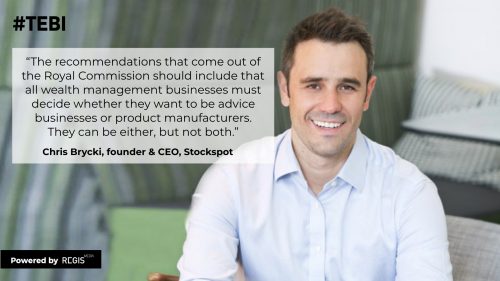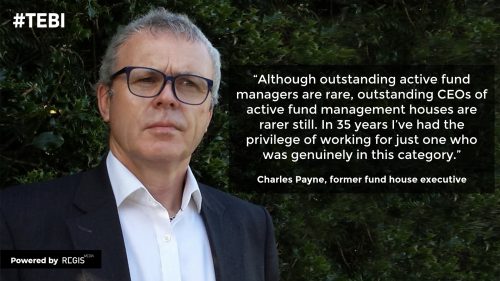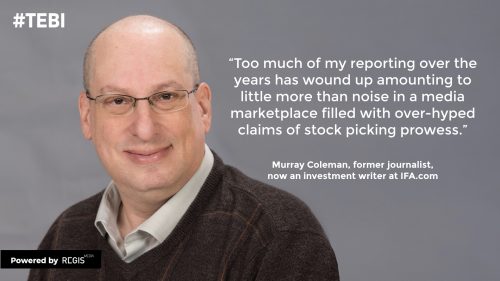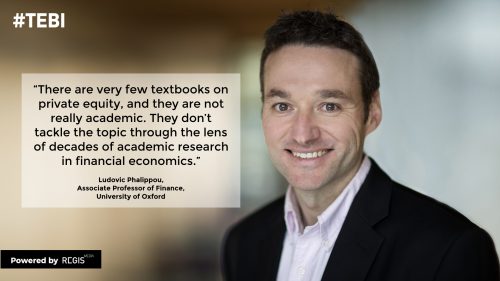
APRIL HIGHLIGHTS ON TEBI
It’s been another hugely busy month for TEBI. Here are the posts that have attracted the most views and shares.
Stunning revelations of adviser conflicts Down Under
All around the world, financial regulators are waking up to a big problem, namely that financial advice is hugely conflicted. In some countries, notably the UK and the Netherlands, steps have been taken to loosen the connection between advisers and product providers, though even in those countries, most advisers, for whatever reason, continue to recommend products that aren’t in their clients’ best interests. But in other countries, the old “bank model”, which means adviser are financially incentivised to sell particular products, is alive and well. Australia is one of them.
I have followed with increasing dismay the extraordinarily revelations emanating from the Royal Commission into Australian financial services. Some of the revelations have been truly shocking. This week, for example, the Commission heard how celebrity financial adviser Sam Henderson “gave deeply flawed superannuation advice” to a client, Donna McKenna, which would have earned his firm thousands of dollars in fees, but cost her $500,000 for withdrawing early from one of her public sector super funds. When McKenna reported Henderson to the Financial Planning Association of Australia, the adviser asked that the investigation be kept secret because of his media profile.
In this guest post for TEBI, Chris Brycki, founder and CEO of the Sydney-based robo-adviser Stockspot, gives his opinion on the Commission and sets out the lessons to be learned from it.
Read Chris Brycki’s article here
How are EBI and ESG best combined?
There are two huge trends in global investing at the moment; one is the move towards evidence-based decision making, and the other is the growing popularity of ESG investing. I’m an advocate of both. How, then, can investors like myself combine the two to maximum effect?
There’s a healthy debate taking place just now about asset management and corporate governance. In the US, for instance, a campaign has been launched to boycott two big passive fund providers, Vanguard and BlackRock, over their refusal to dispose of their holdings in gun manufacturers.
Although I generally encourage shareholder activism and support tighter gun controls myself, I don’t think that’s the best approach. When you sell a stock, you lose any ability you had to encourage, or compel, that company to change its ways. I would argue that passive managers, which have no choice but to invest in companies for the long term, are far better placed to hold boards to account than active fund managers, which typically buy and sell stocks far more frequently than they should.
Time for a new breed of fund house CEOs
The UK’s financial regulator, the FCA, recently set out new rules designed to improve competition in the asset management industry. I must say I’ve become a little bit cynical about the time it’s taking to persuade the big fund houses to start putting consumers’ interests ahead of their own. We won’t see wholesale improvements, in my view, until the FCA forces companies to comply, and until investors start successfully suing fund houses that have deliberately hidden the full extent of fees and charges or have been dishonest about their past performance.
But, for an alternative perspective, I’ve invited Charles Payne to give his reaction to the FCA’s announcement. Charles has worked in the fund industry for 35 years, and is best known for the 14 years he spent at Fidelity International, where, among other things, he served as Investment Director and Head of Equity Product Management. He recently left the industry after becoming increasingly disillusioned with it. In this post, he gives the FCA’s new rules a cautious welcome, and calls for a new breed of fund house CEO to tackle the challenges the industry faces.
Read Charles Payne’s article here
What’s the point of investing in bonds?
Let’s face it, bonds are a pretty boring asset class. The stock market is far more exciting. That’s where the biggest returns are found and the real money is made. It’s also what the financial media tends to focus on.
Bonds, in fact, have been out of favour for several years, with low-interest rates not seen the 1950s resulting in paltry yields. Why then, should you invest in bonds at all?
Bonds perform two main functions in an evidence-based portfolio. First, and most importantly, they offset the volatility of equities. Everyone has their own capacity for risk, and it’s important that investors take as much risk as they need to take, are willing to take, and can afford to take, but no more. Bonds are far less volatile than stocks, and they often hold up reasonably well when stock markets fall. The two assets in tandem are therefore an effective combination, and you can set your overall risk exposure by adjusting the balance of stocks and bonds you hold.
Six ways fund managers can cut their overheads
It’s one of the ironies of Thatcherism that, more than 40 years after the sudden deregulation of financial markets known as the Big Bang, the one sector of the UK economy that has not yet been subjected to Thatcherite-style cost-cutting is asset management.
It’s escaped it for several reasons — not least the fact that managing other people’s money is awesomely lucrative. It other words, fund managers haven’t really needed to tighten their belts. But it’s now widely agreed that they now have no choice.
Faced with tighter regulation, a greater emphasis on transparency and the rise of low-cost providers like Vanguard, Britain’s fund houses simply have to trim the fat. If they don’t, they can’t expect to enjoy anything like the average 36% profit margins identified in the FCA report on competition in asset management published last year.
Why most financial media hinders rather than helps
This is a new departure for TEBI — our very first guest blog post. It’s by Murray Coleman who, like me, is an experienced journalist. He’s written for some of the most popular publications in the financial media, including The Financial Times, The Wall Street Journal, Barron’s, MarketWatch and Investor’s Business Daily.
Something else that Murray and I have in common is that we’ve recently started to work with financial advice businesses; I now work on a part-time basis for RockWealth, here in the UK, while Murray has recently joined Index Fund Advisors — or IFA.com — in Irvine, California.
Index Fund Advisors, you may recall, is the firm I collaborated with in producing the award-winning documentary Index Funds: The 12-Step Recovery Program for Active Investors. It’s a hugely impressive operation, and its website, dare I say, has an even more comprehensive range of content and academic research about investing than this one!
In this article, Murray discusses an issue I’ve touched on many times myself, namely the conflicted nature of the financial media. To be clear, I’m proud to be a journalist, and I’m a passionate believer in the importance of a free press. And, in my experience, it’s not that journalists deliberately set out to mislead the investing public. The fact is, however, that most of what gets written and broadcast in both the mainstream financial media and the trade press, is of far more benefit to the investing industry than it is to investors.
Read Murray Coleman’s article here
Private equity laid bare
It is, apparently, a good time to be managing a private equity fund. According to the alternative assets data provider Preqin, it currently takes PE firms 11 months on average to raising a fund, compared with the 19 months it took them in 2010.
And as well as spending less time raising money, they’re also raising more of it. PE funds raised $484bn in 2017, Preqin says, compared with $414bn 2007, before the global financial crisis.
The FT puts this interest in private equity down to “yield-starved investors desperately seeking a place to park their cash”.
But is investing in private equity funds really such a good idea? Ludovic Phalippou is Associate Professor of Finance at the University of Oxford’s Said Business School. He has recently written a book called Private Equity Laid Bare in which he challenges the assumption that private equity is the no-brainer investment that many institutional and high-net worth investors believe it to be.
Even more than the mutual fund industry, Professor Phalippou claims, the private equity sector is riddled with conflicts of interest. He says there are also serious issues around transparency, both in terms of fees and the reporting of fund performance.
If you’re thinking of joining the rush to invest in private equity, this interview is essential reading.
Read the interview with Ludovic Phalippou here
What does TEBI do for advice firms?
The Evidence-Based Investor is primarily aimed at investors — not just individual investors, but also institutional ones, such as charities and pension funds. But we’re here to help financial advice firms too, or at least firms that share our evidence-based philosophy. So, what exactly does TEBI do for those advisers?
Well, the main way we can help is with content and social media management. In conjunction with our colleagues at Regis Media, the firm that sponsors and produces TEBI, we provide a wide range of content about investing, behavioural finance, financial wellbeing and the benefits of using a financial adviser.
Sharing high-quality content is something that every modern advice firm should be doing, particularly those that want to grow. How do you expect people to find you, let alone work with you, if you’re not constantly articulating your philosophy, your values, and what makes you different from the thousands of other advisers available to choose from?
Also worth reading
Investor behaviour
The skill of managing luck (Daniel Egan)
Risk-taking: Is it nature or nurture? (Mark Rzepczynski)
The four elements of patient investing (Brendan Mullooly)
The challenge with investing is to minimise regret (Josh Brown)
The disposition effect: what it is and how it harms returns (Larry Swedroe)
Personal finance
Don’t be like Prince: leave a will (Karen Heller)
There is no best time to invest (Howard Linzdon)
The advantage of stocks over property (Financial Samurai)
What are you saving and investing for? (Financial Samurai)
Guidelines for projecting retirement savings (Charles Rotblut)
Bond investing is about reaching for safety, not yield (Jack Vogel)
The advice profession
Doing the right thing (Tony Isola)
How advisers can harness the power of robo (Diane Harrison)
What does a woman want from a financial planner? (Carolyn Gowen)
The best of the rest
Beware the errors of “big data” (Nassim Taleb)
50 ways the world is getting better (Ben Carlson)
Retirement has its drawbacks too (Roger Nusbaum)
The future looks like history, not last year (Tim Richards)
Let’s make financial literacy a year-round thing (Dina Isola)
What should European investors make of Lyxor’s low-cost ETFs? (Monevator)
Calling evidence-based advice firms
Every day investors are bombarded with information that hinders, rather than helps, them in achieving their financial goals. Regis Media, which produces TEBI, has a wide range of branded content to help advisers explain how investing really works. You’ll find details and prices on our website and examples of our work on our YouTube channel.













